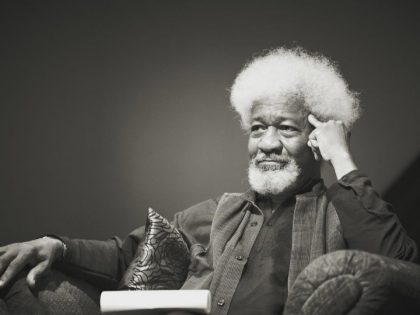Museum of memory
An eye-opening documentary on African literary titan Wole Soyinka wants us to laud his “politics” without ever having Soyinka himself talk about them.

Promotional still from Ebrohimie Road © 2024.
Wole Soyinka is a towering figure in the global sphere of literature, arts, and culture. So the emergence of a feature documentary, Ebrohimie Road, directed by Kola Tubosun, and narrated by Femi Elufowoju Jr., about the life of the Nobel Laureate comes as no surprise.
Ebrohimie Road (the place) is the root of everything in the film. There is a callback to a famous image and an interview in that setting. Soyinka talks about his need to have trees around him everywhere he lived. Ebrohimie Road becomes a window into Soyinka’s environmentalism, a reflection of man’s relationship to the land and nature. It becomes a veil where we could peek at Soyinka’s anti-war “politics” during the Nigerian Civil War, and its consequences.
The subtly evocative reactions of the people featured in the film foster a connection with the audience. The interviewees don’t have to remember the exact specifics of an action or event, but they don’t miss a beat in communicating their feelings. It matters less what the name of the pet monkey of Soyinka is or whether a meeting took place in 1984 or 1986; what matters is the sense of communal joy—for example, after the news of Soyinka’s release from prison after being detained for his anti-war rhetoric, or the befuddlement when he was controversially denied the professorship at the University of Ibadan.
Ebrohimie Road is very much about Soyinka, for better and worse. It reflects his relationship with his kids—listen to his daughters call him ‘dad’ and reflect when they used to knot his hair, and listen to his first son call him ‘my father’ or “professor,” and draw your conclusions. Yet, the film sometimes also reflects the reluctance of those who speak of Soyinka to say more, as if there’s more than what’s being said, whether it is the issue with the University of Ibadan or his time in Cambridge and Ghana in exile.
As much as the documentary should center on Wole Soyinka, there’s an extolling of his individualism. The apartment at No. 8 Ebrohimie Road should be made a monument, a few said in the documentary, largely because of how much it reflects Wole Soyinka. And there’s a contradiction in that as well: the need to immortalize that house is usually juxtaposed with the houses of Ernest Hemingway in Cuba and Toni Morrison in the US. However, the politics of Hemingway and (especially) Morrison are stated clearly and, if not worn like badges, are strongly connected to them. In the case of Soyinka, he never quite showed it—even in this documentary, there’s an old clip from an interview where he mentions that his stance against the civil war isn’t political.
This film tries to have it both ways; it wants us to laud Soyinka’s “politics” without ever having Soyinka himself talk about them or even properly scratching the surface. One senses that perhaps Ebrohimie Road steers clear of the political road so as not to pry at what Soyinka’s politics has become now; a sort of endorsement of the political personnel and superstructures he seemed to have been against in the 1970s, and a kind of action that would probably give legs to the somewhat misguided notion of “as you grow older, you become more reactionary, it’s just common sense.” Much of the film’s discourse valorizes Soyinka in a political and revolutionary manner while ensuring no political utterance is made. Thus, the film stumbles, and doesn’t quite do itself justice.
Notwithstanding the above, Ebrohimie Road is still an eye-opening work that centers the road itself as the protagonist. Soyinka’s younger son, Makin, gives us insight into the communal character of Ebrohimie Road (the place), and its role as a bus stop for television giants that dominated Nigeria from the 1980s to the 2000s. The film also uses the road to reflect the current state of society and how our relationship with nature has seemingly given way to mindless consumerism; what was once seen as a home of creativity, culture, family, and spirituality is now a bank, a data center, and a parking lot. It’s brief, but it’s poignant and is reflected by both Soyinka’s look of disdain at a picture of what Ebrohimie Road has become and the later reveal that he’ll never visit.
Ebrohimie Road is many things. A reflection of a complicated, familial, and multi-layered past. A ground zero for a literary titan. A contradiction and reflection that having a say in politics and being political may not necessarily be the same. A sense of community, shared experience, and a sad reality of what our way of life may have wrought on our environment. And, perhaps best summed up by one of the interviewees: a museum of memory.




